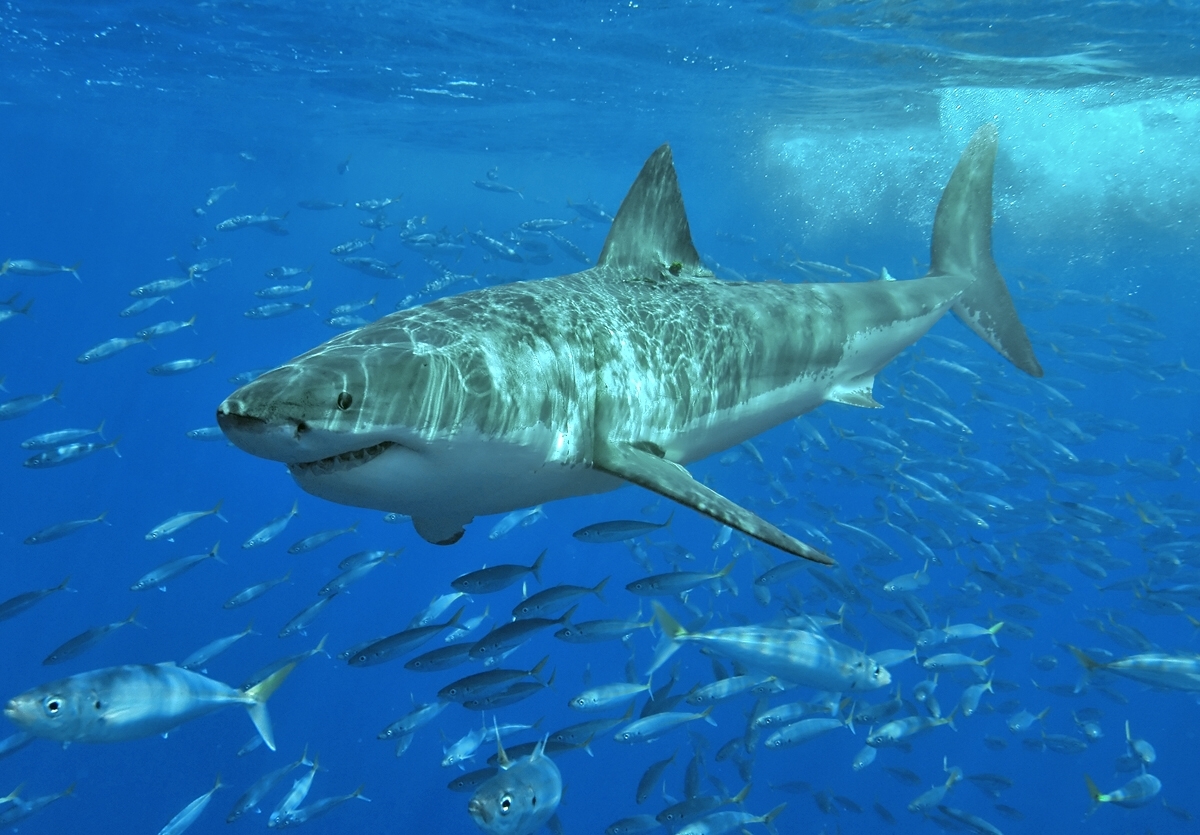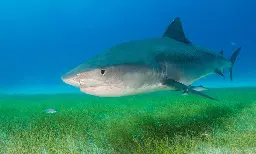
Sharks, Rays and family
- Understanding Shark Fins & Types (Dorsal Fin, Pectoral, Ventral, Anal & Caudal Finwww.sharksider.com Understanding Shark Fins & Types (Dorsal Fin, Pectoral, Ventral, Anal & Caudal Fin
One of the best ways to determine different species of sharks is by looking at their fins. Learn all about them from the experts at SharkSider.com.
- Why Do Fishes Rub on Sharks? Intriguing Behavior May Have Ecological Functionwww.sciencetimes.com Why Do Fishes Rub on Sharks? Intriguing Behavior May Have Ecological Function
Marine biologists have spotted an intriguing behavior of fish chafing themselves against a shark's skin in over a dozen locations worldwide. What could be the possible ecological function of this serving both species?
Turns out schools of fish hang out around sharks to use their skin as an exfoliator 🤣 and to tag along and save energy.
- 30 Interesting Facts about Sharks

Fact# 30.
Sharks use heartbeats to follow their prey. Sharks have nodules on the nose called ampullae of Lorenzini. They can sense electricity with these nodules, therefore the electrical pulse that comes from a beating heart acts like a signal for close by sharks. Fact# 29.
No one can see their ears, and that doesn’t stop them from being able to hear us from more than 2 football fields away. That’s because sharks have inner ears only, using them they can track the sound of the prey from a distance of 800 feet or more. Fact# 28.
This one is the interesting facts about sharks, if you see a shark circling and wonder if it’s about to attack a prey, here is the clue: The shark would hunch its back, lower the pectoral fins (near its belly) and whirl in crisscross motions.30 Interesting Facts about Sharks-shark circling Fact# 27.
Unlike human beings, who have their upper jaw fixed on the skull, a shark can stick out and dislocate its upper jaw to grab and retain its prey. Fact# 26.
Sharks come from a family of fish that have cartilage skeletons made of a tissue which is lighter and more flexible than bones.
Also explore Amazing Facts About Blue Whales Fact# 25.
This is the amazing facts about sharks that they have an amazing sense of smell, so strong that they can sense a single drop of blood in an olympic-size pool. Fact# 24.
Sharks breathe with a series of 5 to 7 gill slits on either side of their bodies. Fact# 23.
Sharks are able to see in muddy water because of a special characteristic that makes their eyes extra sensitive to light. A membrane on the back of the eye called tapetum lucidum reflects back sunlight into the eye; as a result sharks can make more use of slightest light available. Fact# 22.
Volusia County has reportedly had more shark attacks than anywhere else in the entire world. Here 210 attacks have been reported since 1882. However 90% of these were just bites with low figures of fatalities. Fact# 21.
Great white sharks are fussy eaters. Their diet needs lots of fat and after 1 bite a great white shark decides whether that meal will satisfy its dietary needs. If it doesn’t, then the shark will swim away leaving the rest.30 Interesting Facts about Sharks-Great white sharks are fussy eaters Fact# 20.
The surprising faacts about sharks is the mega-mouth shark wasn’t discovered until 1976, with just 41 known sightings of the species till now. The mega-mouths much like whale sharks are filter-feeders having huge jaws which extend beyond their eyes.30 Interesting Facts about Sharks-mega-mouth shark Fact# 19.
Sharks have more senses than humans. Sharks can sense pressure waves and because of that they are able to detect both movement and direction of an object. Fact# 18.
Sharks constantly shed their teeth. Shark teeth are inexpensive yet popular beach souvenirs.30 Interesting Facts about Sharks-shark teeth Fact# 17.
The whale sharks are the largest species, and the pygmy sharks are the tiniest! They measure approximately 8 inches in length and can make light on their own (this helps them to hunt underwater). Fact# 16.
Hammerhead shark is a new species which was discovered in 2006 by DNA testing. An official verification is still awaited.30 Interesting Facts about Sharks-Hammerhead shark Fact# 15.
Another interesting facts about Sharks move like planes! They create forward movement by moving their tail, which works like a propeller. As sharks move forward, water moves over their fins as if they were wings.
Also get to know about Top 10 Amazing Megalodon Facts Fact# 14.
Their liver contains lots of oil, which makes their liver a somewhat buoyant organ, which helps in keeping their balance underwater. Fact# 13.
Sharks can be tracked with geographic profiling. Geographic profiling pins down locations where attacks may occur, though attacks are generally uncommon. Fact# 12.
Hammerhead sharks are well-known for their unusually shaped head, called cephalofoils, which makes them superior hunters.30 Interesting Facts about Sharks-Hammerhead sharks Fact# 11.
Sharks are susceptible to moon’s control of ocean tides. Moon’s phase affects their eating habits and draws them close to shore. Fact# 10.
Shark lives up to 25 years on an average, however some can grow to be as old as 100! Fact# 9.
Surfers are more probable to die by drowning rather than from a shark attack. Fact# 8.
Amother amazing facts about sharks are Great white sharks consume eleven tons of food per year! Fact# 7.
The tooth shaped skin of sharks called denticles, allow them to move quickly through water without getting algae and barnacles deposits on their skin.30 Interesting Facts about Sharks-shark denticles Fact# 6.
We may think of sharks as voracious, man-eaters, however in actuality, only 3% of above 500 species are known to have attacked humans. 30 Interesting Facts about Sharks-human attack Fact# 5.
Sharks respond “yummy hum” sound injured fish make this sound attracts sharks towards injured fishes; it is an infrasonic sound which humans can’t hear.30 Interesting Facts about Sharks-yummy humm Fact# 4.
Nearly 50 species of different sharks have a light emitting organ called photospheres. They use it to attract mates.30 Interesting Facts about Sharks-photosphere
Fact# 3.
This one is another interesting facts about Female sharks can even reproduce without contact from a male shark, this act is called parthenogenesis.30 Interesting Facts about Sharks-parthenogenesis Fact# 2.
Sharks living in frosty waters heat their eyes with a special organ in their eye socket. This enables them to hunt even in extreme temperatures.30 Interesting Facts about Sharks-shark eye Fact# 1.
The gestation period of a pregnant shark can is anywhere from 5 months to 2 years. (e.g. pregnant shark lady in the image)
